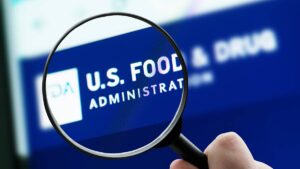Health Check: Memphasys inks its first major deal to sort the ‘swimmers’ from the ‘floaters’

In life's great race up the fallopian tube, Memphasys is ensuring that only the best 'tadpoles' are the winners. Pic via Getty.
- Memphasys shares double on “transformational” distribution deal
- Proteomics airs encouraging esophageal cancer diagnosis results
- News on the ‘ins’ and ‘outs’ – and we’re not talking footy finals
Memphasys (ASX:MEM) has signed a “transformational” Middle Eastern distribution agreement for its sperm separation device, Felix.
While the minimum initial order is a modest $325,000, the company hopes the deal will be the first of many, with negotiations underway with New Zealand, Japanese and Indian parties.
The Felix device enables a gentler separation of sperm than the current methods, thus avoiding damaging the precious tadpoles. In IVF, it’s crucial to use only the best ‘swimmers’, given the low chance of success in the first place.
The initial agreement is with the Qatar-based International Technical Legacy (ITL), which provides Middle East and North Africa in IVF services. The five-year agreement spans 15 countries and around 350 clinics, covering circa 140,000 IVF cycles a year.
While the minimum order is for a modest $325,000, Memphasys hopes the tie-up will ensure “rapid adoption” across these geographies.
The deal is provisional on European (CE Mark) approval. The company lodged its application in June and expects approval within 12 months.
ITL also has first right of refusal over future Memphasys reproductive technologies. These currently include an animal husband variant and an oxidative stress measurement tool called Roxata.
The company also expects revenue from the other envisaged distributorships to flow in the current financial year.
“The board is confident that additional agreements will be secured and announced in the near term,” the company says.
Memphasys has struggled to gain traction over the years, but the ITL deal reflects management’s sharper focus on commercialisation.
Memphasys shares have lost 70% of their value over the last year, but doubled this morning (albeit off a low base).
Proteomics breaks through on esophageal cancer detection
Proteomics International Laboratories’ (ASX:PIQ) push beyond kidney disease detection has been bolstered by the results of a study showing its blood test can detect the early stages of esophageal adenocarcinoma “with high accuracy”.
Caused by the ubiquitous condition chronic acid reflux, esophageal adenocarcinoma is the most common form of esophageal cancer.
Enrolling 350 participants, the study showed the Promarker Eso test could detect stages one and two of the disease with high accuracy. This offers a potential improved screening pathway for an affliction that currently has a median survival time of less than one year.
Currently 90% of esophageal adenocarcinoma cases go undetected.
The study results were published ahead of a World Congress for Esophageal Diseases, pow-wow in Brisbane next week.
Proteomics refers to mapping the structure and function of proteins that, unlike genes, differ from cell to cell and change levels over time.
The assays identify “biological fingerprint” protein biomarkers via a simple blood test.
The company recently launched its diabetic kidney disease test Promarker D in the US and Australia. It is also developing assays for endometriosis and oxidative stress.
Orthocell reveals ‘real world evidence’ results
Orthocell (ASX:OCC) says its Remplir nerve repair device has achieved an 81.1% success rate in actual surgical procedures.
The interim results from the multicentre post-market study of 67 procedures showed that 81.2% of muscles “innervated” by repaired nerves achieved functional motor recovery.
Furthermore, 89.5% of nerve decompression procedures showed a significant improvement, or complete relief of symptoms.
“No post-treatment complications or adverse reactions to Remplir were reported in any patient,” the company says.
The US Food and Drug Administration (FDA) approved Remplir in the US$1.6 billion US market in early April. The company began selling there shortly after.
The latest ‘real world evidence’ will support the US rollout and provide fodder for European and UK regulatory submissions this quarter.
The results were “consistent with previously published clinical trial outcomes”.
Orthocell CEO Paul Anderson says the data “confirms the superior and predictable outcomes that Remplir delivers and is testament to why over 200 surgeons across more than 165 hospitals (and growing) are now using the product.”
Alterity raises $20 million
Alterity Therapeutics (ASX:ATH) has raised a handy $20 million to further its clinical trials in Parkinsonian neurodegenerative disorders.
By way of a placement, the deed was done at 1.2 cents per share, a modest 7% discount.
“We elected to execute this placement due to inbound interest from a high-quality international healthcare-focused fund that anchored the transaction,” says Alterity CEO Dr David Stamler.
In April the company reported the “robust” results of a phase II trial in multiple system atrophy (MSA), which tested its drug candidate ATH-434.
MSA is a rare and rapidly progressive Parkinsonian disorder.
The data showed a “clinically meaningful” benefit and favourable safety.
The company will use the funds advance its “clinical and regulatory strategy” with the FDA and other agencies.
Index ch-ch changes
Life sciences companies feature in the September quarter S&P/Dow Jones revamp of the ASX200, ASX300 and All Ordinaries indices, effective from September 22.
Across all companies the comings and goings were elevated, with more than 150 changes.
Broker Morgan Stanley said this resulted from “strong index momentum and methodology changes”.
Trans-Tasman chemist group EBOS Group (ASX:EBO) has been added to the ASX200, at the expense of Clarity Pharmaceuticals (ASX:CU6) and PolyNovo (ASX:PNV).
Olives are looking juicy, however, with the addition of Cobram Estate Olives (ASX:CBO) to the ASX300. No, that has nothing to do with biotech – just quite fancy some olives right now. Preferably in a martini. Shaken, not stirred, naturally.
Unsurprisingly, Opthea (ASX:OPT) has been removed from the ASX300, after the failure of its two-phase III eye trials in March. Monash IVF Group’s (ASX:MVF) departure won’t come as a shock to most observers, too, after the year it’s been having thus far.
Exiting the All Ordinaries – at least for the time being – are Anteris Technologies (ASX:AVR), Arovella Therapeutics (ASX:ALA), Avita Medical (ASX:AVH), Cyclopharm (ASX:CYC), 4D Medical (ASX:4DX), Imugene (ASX:IMU), MedAdvisor (ASX:MDR) and Trajan Group (ASX:TRJ).
The omission of 4D Medical is particularly eye-raising, given the lung imager’s 350% share romp over the past month (and a 26% surge today).
You can view the full ins and outs > here.
Speaking of 4D Medical, though, the company today said it had signed agreements with the Royal Melbourne Hospital and Spectrum Medical Imaging to deploy its lung health analysis software.
This includes imaging for the recently initiated National Lung Cancer Screening Program.
4D also has signed up with a “leading global pharmaceutical company” to launch a lung screening program in Brazil.
The initial agreement covers up to 10,000 scans to August 2026, across eight hospitals. The company hopes this will lead to national coverage.
Last week, 4D Medical said the FDA had approved its pulmonary embolism detection device, CT:VQ.
The company also announced public US reimbursement.
UNLOCK INSIGHTS
Discover the untold stories of emerging ASX stocks.
Daily news and expert analysis, it's free to subscribe.
By proceeding, you confirm you understand that we handle personal information in accordance with our Privacy Policy.








